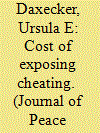|
|
|
Sort Order |
|
|
|
Items / Page
|
|
|
|
|
|
|
| Srl | Item |
| 1 |
ID:
117015


|
|
|
|
|
| Publication |
2012.
|
| Summary/Abstract |
This article investigates the relationship between international election observation, election fraud, and post-election violence. While international electoral missions could in principle mitigate the potential for violence by deterring election fraud, the ability of international observers to detect manipulation may in fact induce violent uprisings. Serious irregularities documented by international observers provide credible information on election quality, which draws attention to election outcomes and alleviates coordination problems faced by opposition parties and society. When elections are manipulated to deny citizens an opportunity for peaceful contestation and international observers publicize such manipulation, violent interactions between incumbents, opposition parties, and citizens can ensue. Consequently, the author expects that fraudulent elections monitored by international organizations will have an increased potential for subsequent violence. This expectation is evaluated empirically in an analysis of post-election conflict events for African elections in the 1997-2009 period. Using original data on electoral manipulation and reputable international election observation missions, findings show that the presence of election fraud and international observers increases the likelihood of post-election violence. Matching methods are employed to account for the possibility that international observers' decisions to monitor elections are endogenous to the occurrence of violence in the electoral process. Results for matched samples confirm the findings in the unmatched sample. A variety of robustness tests show that the results are not influenced by the operationalization of independent variables and influential observations.
|
|
|
|
|
|
|
|
|
|
|
|
|
|
|
|
| 2 |
ID:
137818


|
|
|
|
|
| Summary/Abstract |
This paper extends systematic analyses of maritime piracy by verifying the robustness of empirical results and examining the forecasting ability of empirical models. Recent research by Ward, Greenhill and Bakke (2010) finds that statistically significant relationships frequently offer poor guidance when it comes to anticipating the inception of civil war. We assess the predictive ability of purported causal factors of piracy using evaluative statistical tools such as receiver-operating characteristic plots, out-of-sample predictions, and outlier analysis. Statistical results for in-sample and out-of-sample tests show that while factors such as military capacity, population size, coastline length, and trade volumes are statistically related to piracy, state fragility has by far the strongest predictive effect despite only being moderately statistically significant in the models. Outlier analysis demonstrates that while several countries experience higher numbers of piracy incidents than predicted, empirical models are generally robust to the presence of outliers. For policymakers, the findings suggest that counter-piracy efforts focused on capacity-building measures have the greatest potential for reducing the piracy threat.
|
|
|
|
|
|
|
|
|
|
|
|
|
|
|
|
| 3 |
ID:
103118


|
|
|
|
|
| Publication |
2009.
|
| Summary/Abstract |
When does bargaining between government and opposition groups turn violent? In this article, I argue that groups with cohesive, developed organizational structures are less likely to engage in conflictual behavior. Opposition movements are often divided into moderate and radical challengers, and groups without developed organizational structures cannot limit radicals' demands. The argument is supported in a comparative analysis of bargaining processes in Algeria and Chile in the late 1980s. In Algeria, the primary opposition group was marred by internal divisions and tensions between radical and moderate elements. When the party emerged victorious in democratic elections, the government feared that radical elements would soon take over, canceled election results and attempted to reestablish control by using force. Opposition parties in Chile, however, presented a cohesive and unified alternative to the Pinochet regime, which contributed to a peaceful transfer of power.
|
|
|
|
|
|
|
|
|
|
|
|
|
|
|
|
| 4 |
ID:
079905


|
|
|
|
|
| Publication |
2007.
|
| Summary/Abstract |
While evidence continues to mount that democracies resort to military force reluctantly, the transition to democracy may in fact be a dangerous and conflictual one. Given the emphasis now being put on democratization, a reassessment of the relationship between the stability of domestic institutions and interstate conflict seems fitting. To date, the evidence remains mixed. No clear consensus has emerged on whether regime transition either increases or decreases conflict propensities. Employing a logit specification with splines and robust standard errors, this research analyzes the conflict behavior of transitioning states for the 1950-2000 period. The results indicate that `rocky' transitions or democratic reversals increase the likelihood of conflict occurrence. I demonstrate, however, that this result is driven by the conflict behavior of autocratizing countries. An interaction term shows that although regime change itself may increase conflict propensities, such exacerbating effects are reversed for democratizing states.
|
|
|
|
|
|
|
|
|
|
|
|
|
|
|
|
|
|
|
|
|